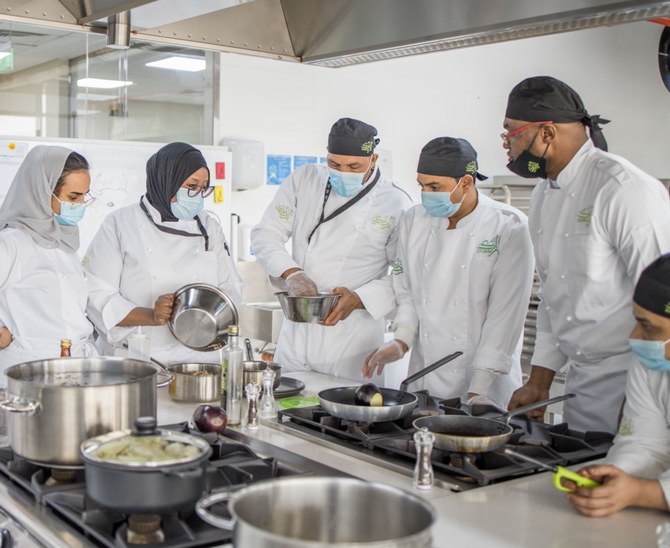DUBAI: The national cuisines of few countries can boast the variety of influences found in Saudi Arabian dishes, thanks to the remarkable assortment of flavors and ingredients introduced to the Kingdom over centuries by pilgrims, merchants and travelers.
The variety of traditional dishes that can be found across the country reflect these diverse cultural influences — from the likes of India, North and East Africa, South and Central Asia and the Levant — that enriched and seasoned the Kingdom’s traditions.
Now, Saudi chefs and the hospitality sector are once again using food to help build bridges between nations and cultures. One of the organizations that is embracing this art of “culinary diplomacy” is The Red Sea Development Company, which is managing the new tourism megaproject taking shape along the Kingdom’s Red Sea coast.
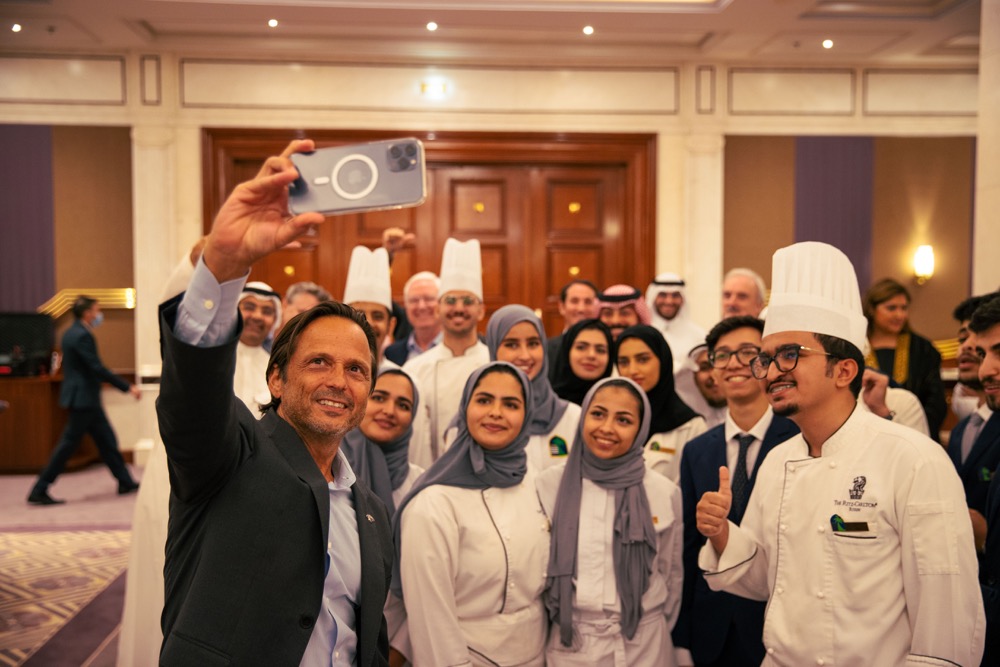
TRSDC CEO John Pagano with a group of Saudi hospitality students. (Supplied)
In line with the aims of Saudi Vision 2030, the nation’s strategy for economic diversification, TRSDC is working to stimulate new industries, create jobs, encourage entrepreneurism, and drive growth in the tourism, leisure and hospitality sectors.
“At the moment our focus is to bring young Saudis into the hospitality industry,” Lars Eltvik, the company’s senior education adviser, told Arab News.
“This is a new industry to the Kingdom and there has been a very limited offering of hospitality and culinary education in the country before. It is not dissimilar to what used to be the case in Dubai, 20 years ago.”
The Red Sea Project is a plan for a sustainable tourism resort covering about 28,000 square kilometers along Saudi Arabia’s western coast, including more than 90 unspoiled islands. The 50 hotels and 1,300 residential properties that will be built there will be served by some of the Kingdom’s top restaurants, according to Eltvik.
“We want to be able to attract, document and develop food from all the regions of Saudi Arabia so that it can then be presented in luxury hotels across the Red Sea Project,” he said.

TRSDC is building partnerships with institutions across the Kingdom that were founded to preserve and promote Saudi cuisine. (Supplied/TRSDC)
Eltvik has worked in the hospitality sector and hospitality education for three decades. Between 2001 and 2009 he was based in Dubai, where he worked at the Emirates Academy of Hospitality Management.
He hopes that the success the sector has enjoyed in the UAE’s commercial capital can be replicated in Saudi Arabia on a shorter timescale and in a way that is more faithful to the nation’s cultural sensitivities.
“In Saudi Arabia, everything is on the fast track now,” said Eltvik. “We are working to achieve the same (as we achieved in Dubai), and more, but in a very compressed time frame. At TRSDC, we are looking to get on board tens of thousands of staff, with a strong focus on hospitality and, within the hospitality sector, a focus on the culinary arts.”
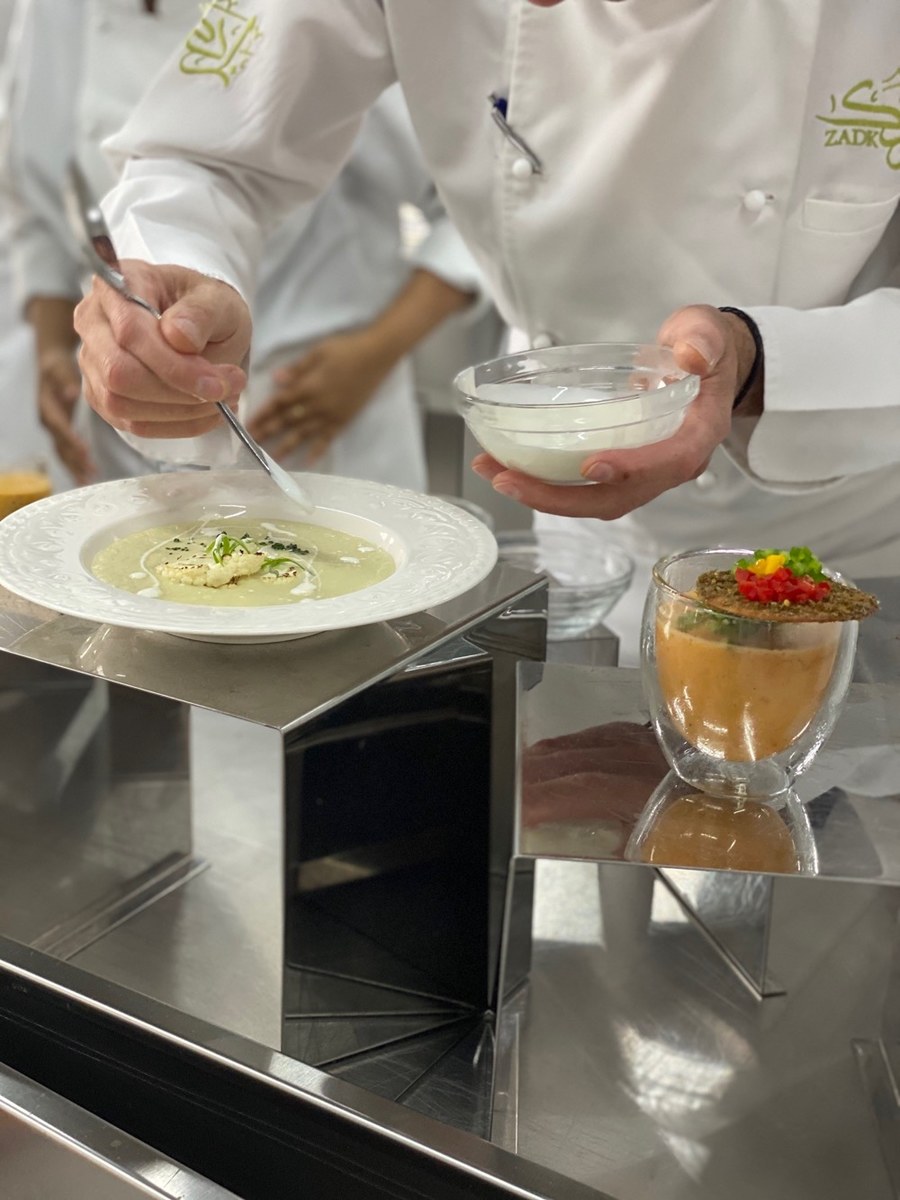
Saudi chefs and the hospitality sector are once again using food to help build bridges between nations and cultures. (Supplied/ZADK)
The company is working to promote the hospitality industry as a desirable career option for young Saudis, he said, in keeping with the government’s Saudization drive. To that end, education authorities in the Kingdom have implemented a number of programs in which TRSDC will sponsor trainees that will eventually fill essential roles in the sector, he added.
“We are focusing on the authenticity of enhancing tourism and hospitality through food in the Kingdom, and through the projection and education of young Saudis to proudly present their history and their past through the culinary experience,” Eltvik said.
There is a consensus that simply replicating the type of restaurants and cuisines that can be found in cities around the globe will not help to transform Saudi Arabia into the distinctive culinary destination that is envisioned. A focus on promoting the culinary arts and distinctly Saudi flavors are therefore clear priorities.
FASTFACTS
• The Red Sea Project is a 28,000 sq km sustainable-tourism resort due for completion by 2030.
• The Red Sea Development Company is expected to contribute $5.3 billion to national gross domestic product
While many traditional local dishes are common across the country — such as kabsa, which is made from rice, meat, vegetables and spices, and harees, an Arabian favorite comprised of ground wheat, meat and spices — the flavors, ingredients and cooking techniques can vary widely from one region to another.
The Red Sea port city of Jeddah has long attracted travelers from the region and the world, resulting in dishes replete with Persian, Levantine, Turkish, Maghrebi, and Central and South Asian influences.
In Hijaz, for example, the influences for popular dishes such as bukhari rice, manto (dumplings filled with beef and onion), shish barak (meat dumplings cooked in a yogurt-based stew), and kabli rice can be traced to Central and East Asia, while the origins of the vegetable-based stews that are popular in the region lie in North Africa and the Levant.
In the Kingdom’s central Najd plateau, meanwhile, the local cuisine includes heavier dishes such as soups, stews and sauces that better suit the area’s cooler climate.
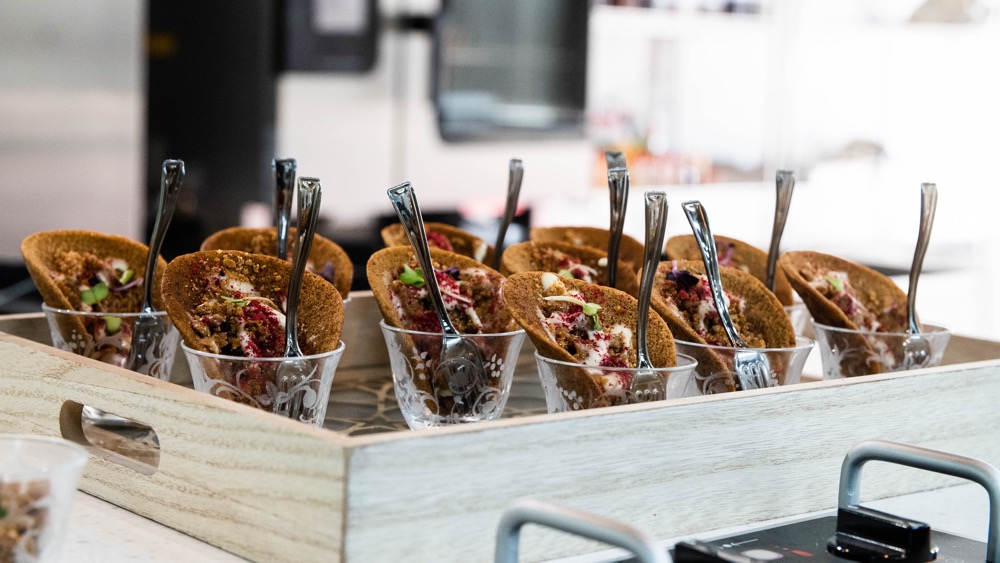
“I created ZADK because I saw that in Saudi Arabia we were lacking an academy to learn about our cultural cuisine,” Rania Moualla said. (Supplied/ZADK)
In March, TRSDC appointed Lawrence Assadourian its culinary director with a mandate to work with Saudi chefs to create unique food options for regional and international visitors to enjoy, while also promoting local favorites.
“One of our missions is community development,” he told Arab News. “How are we, as a group, going to ensure that the Red Sea has a sense of place? (That) it is not just an experience replica of another destination in the world?
“And one of the ways we are looking to do that is to build the necessary programs that will incubate and accelerate Saudi-based chefs. We feel this is important because, long-term, the sustainability of talent should be driven by local people, to complement foreign talent.”
Sustainability is at the heart of what TRSDC is hoping to achieve as the Kingdom’s nascent tourism, leisure and hospitality industries set out to create offerings that are sensitive to local customs and in keeping with the environment.
“We are a regenerative tourism destination,” Assadourian said. “We care deeply about the environment and the integration of the communities in which we are building our projects.
“We need to ensure that we strike a strong balance between internationally experienced cuisine in our destination and how we infuse the culinary and cultural heritage of Saudi Arabia into the entire guest-experience journey.”
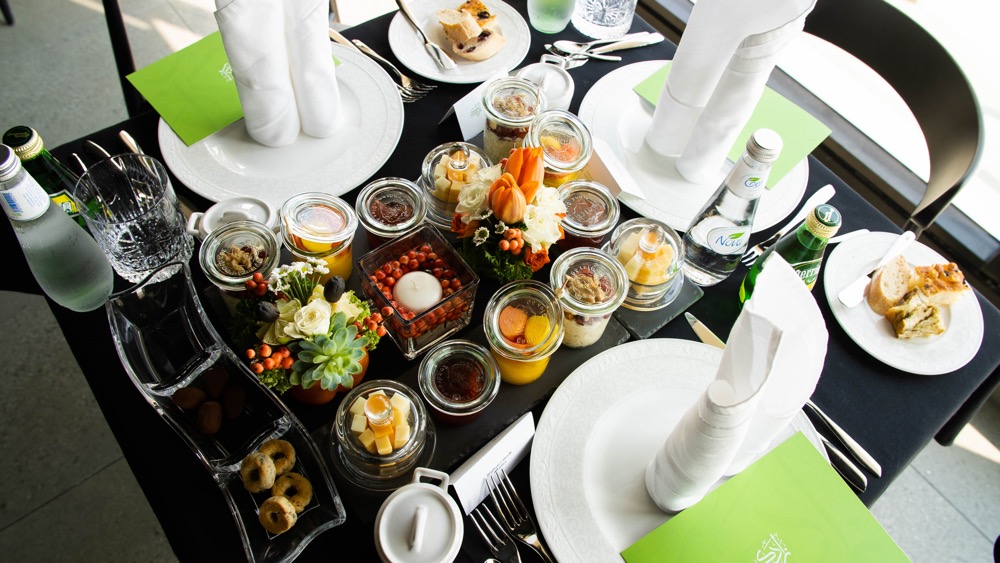
While many traditional local dishes are common across the country, the flavors, ingredients and cooking techniques can vary widely from one region to another. (Supplied/ZADK)
To achieve this, TRSDC is building partnerships with institutions across the Kingdom that were founded to preserve and promote Saudi cuisine.
Among those who welcome TRSDC’s mission to serve up the Kingdom’s culinary traditions to the world is Moe Inani, executive chef and co-owner of Chifty, a stylish restaurant and cosmopolitan lounge in Riyadh.
Although he is an engineer by training, Inani said his first love was cooking, a skill he picked up at an early age while helping his mother prepare meals at the family’s home in his native Jeddah.
After concluding his studies in the US, Inani became a sous-chef at Saison, a Michelin-starred restaurant in San Francisco where he learned to prepare sushi, and later for upmarket restaurants Nobu and Morimoto.
With his background in Japanese cuisine, Inani has created some novel twists on the more conventional local takes on Red Sea fish, and Arab News has learned that discussions are under way for him to collaborate with TRSDC.
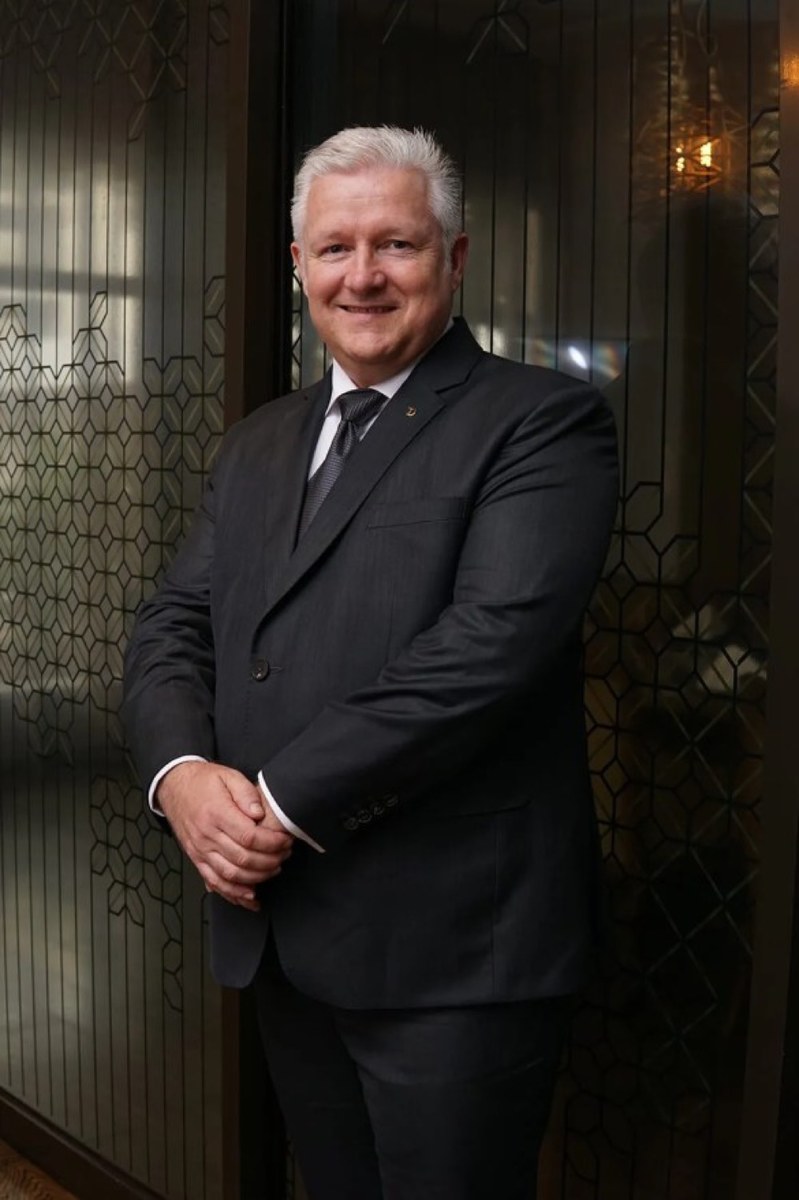
“We want to be able to attract, document and develop food from all the regions of Saudi Arabia,” Lars Eltvik, senior education adviser with the Red Sea Development Company. (Supplied)
“Food has always united us,” Rania Moualla, a Saudi philanthropist and the founder and chair of ZADK, a nonprofit culinary academy in Al-Khobar in the Eastern Province, told Arab News.
The academy was founded in 2018, three years after Moualla published her cookbook, “A Spoonful of Home.” Its mission to nurture Saudi Arabia’s rich culinary heritage by empowering local chefs is similar to that of TRSDC, with which it has formed a partnership.
“I created ZADK because I saw that in Saudi Arabia we were lacking an academy to learn about our cultural cuisine,” Moualla said. “Most of our restaurants are in the hands of expats. I launched ZADK because I wanted to do something sustainable and with a higher impact for the community.”
She said the academy is looking at ways in which it can develop its partnership with TRSDC by helping to train the next generation of Saudi chefs.
“I am looking forward to having their students study at our academy,” Moualla said.
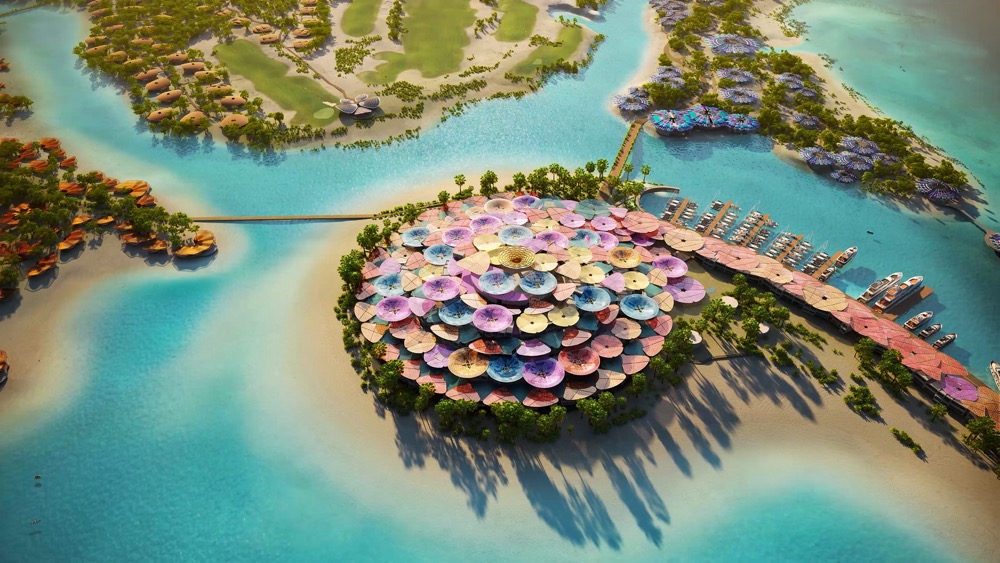
The Red Sea Project is a 28,000 sq km sustainable-tourism resort due for completion by 2030. (Supplied/TRSDC)
In so doing, ZADK, which also has a separate partnership agreement with Culinary Arts Academy Switzerland, aims to promote the Saudi gastronomical scene and ensure it meets international standards.
“Our mission is to develop the best culinary school in Saudi Arabia, make it a platform for social change and teach our cuisine in a way that enables students to learn international cuisines as well as Saudi cuisines,” Moualla said.
“We aim to allow our students to travel the world with Saudi cuisine and heritage.”
It is precisely this kind of culinary diplomacy that TRSDC aims to serve up for visitors to Saudi Arabia to savor and enjoy by 2030, when the Red Sea Project is due for completion.


